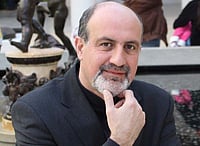It hurts to criticise a sparkling teacher. What makes it more painful is that Salman Khan, of the online Khan Academy, is teacher to nearly 35 per cent of the world’s people, that is, those with access to the internet. In The One World School House, Khan writes with “so let me tell you a bit about my background” ease of how a series of YouTube lessons for his cousin Nadia grew into an electronic peepal tree of learning, watered by believers like Bill and Melinda Gates. He also explains his choice of an austere aesthetic for his videos: all you see is a blackboard with a cursor writing in coloured chalk. (Khan is a voice-over.) In later chapters, he outlines what he’d like the academy to become in a world where schooling does not interfere with education. It’s quite a fascinating account, to be sure, although it takes the well-set, well-known pattern of so many celebrated stories of dreamer-doers.
But do we need Khan to tell us what’s wrong with pedagogy, practised for some centuries now with lockstep militarism? Or why and how classrooms stifle creativity? Or why students tune in to their doodling as they tune out of what a bore is diagramming on the blackboard? It would have been more helpful perhaps to write of how he beat the very system he rips up so thoroughly and how he sustained interest through tenacious self-learning and self-motivation. After all, he’s an outlier whose compass steadily pulled him North-to-Success—Math Olympiads, MIT and a job as hedge-fund analyst—before avocational brilliance brought him fame and a lifelong mission.
And shorn of hype, what Khan’s tutorials do—online and for free—is what systematic note-taking used to do before programmed learning modules, audio and video recordings of lectures, and the internet arrived: allow the diligent to self-learn at the time and place of their choosing. Perhaps Khan’s own scholastic modus operandi.
Closing thought: A lecture, a module of programmed learning, a textbook even, can only be as stimulating as the person behind it. Would Khan have clicked (and been clicked on more than 243 million times) if he were a drone and not the dazzling, democratic Dronacharya that he is?

























